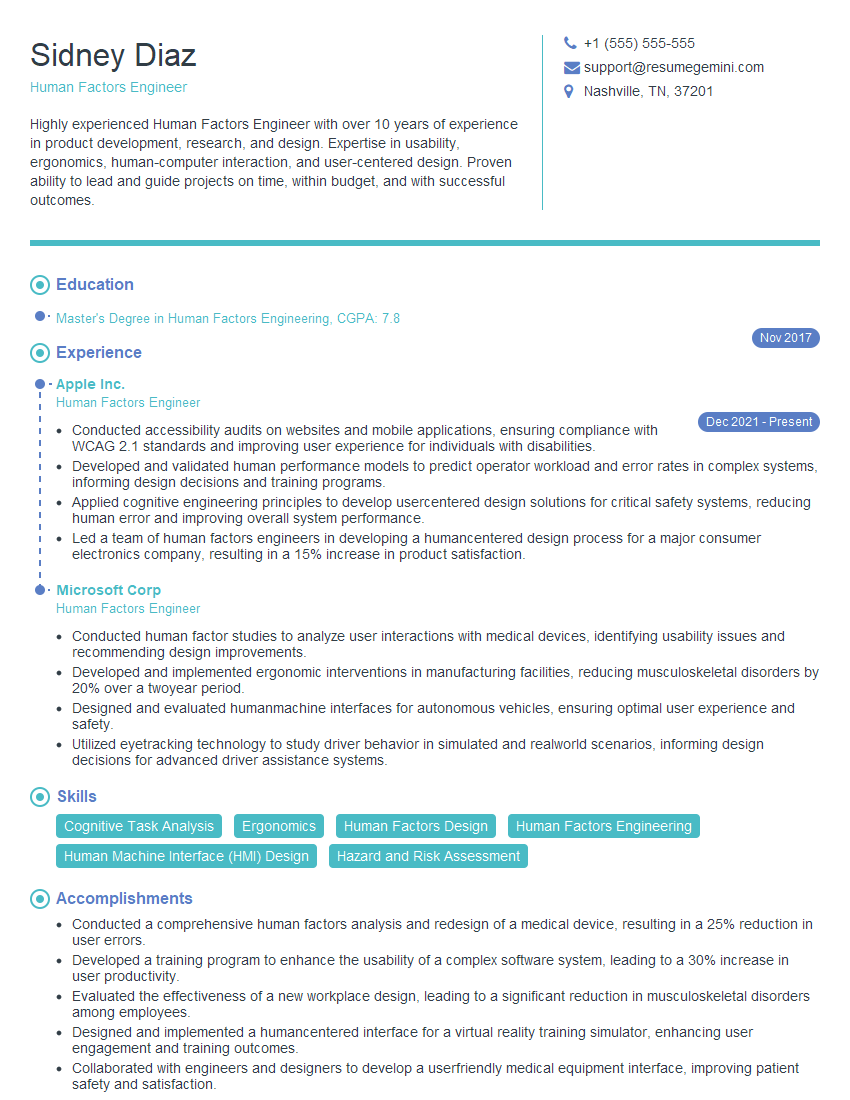Are you a seasoned Human Factors Engineer seeking a new career path? Discover our professionally built Human Factors Engineer Resume Template. This time-saving tool provides a solid foundation for your job search. Simply click “Edit Resume” to customize it with your unique experiences and achievements. Customize fonts and colors to match your personal style and increase your chances of landing your dream job. Explore more Resume Templates for additional options.

Sidney Diaz
Human Factors Engineer
Summary
Highly experienced Human Factors Engineer with over 10 years of experience in product development, research, and design. Expertise in usability, ergonomics, human-computer interaction, and user-centered design. Proven ability to lead and guide projects on time, within budget, and with successful outcomes.
Education
Master’s Degree in Human Factors Engineering
November 2017
Skills
- Cognitive Task Analysis
- Ergonomics
- Human Factors Design
- Human Factors Engineering
- Human Machine Interface (HMI) Design
- Hazard and Risk Assessment
Work Experience
Human Factors Engineer
- Conducted accessibility audits on websites and mobile applications, ensuring compliance with WCAG 2.1 standards and improving user experience for individuals with disabilities.
- Developed and validated human performance models to predict operator workload and error rates in complex systems, informing design decisions and training programs.
- Applied cognitive engineering principles to develop usercentered design solutions for critical safety systems, reducing human error and improving overall system performance.
- Led a team of human factors engineers in developing a humancentered design process for a major consumer electronics company, resulting in a 15% increase in product satisfaction.
Human Factors Engineer
- Conducted human factor studies to analyze user interactions with medical devices, identifying usability issues and recommending design improvements.
- Developed and implemented ergonomic interventions in manufacturing facilities, reducing musculoskeletal disorders by 20% over a twoyear period.
- Designed and evaluated humanmachine interfaces for autonomous vehicles, ensuring optimal user experience and safety.
- Utilized eyetracking technology to study driver behavior in simulated and realworld scenarios, informing design decisions for advanced driver assistance systems.
Accomplishments
- Conducted a comprehensive human factors analysis and redesign of a medical device, resulting in a 25% reduction in user errors.
- Developed a training program to enhance the usability of a complex software system, leading to a 30% increase in user productivity.
- Evaluated the effectiveness of a new workplace design, leading to a significant reduction in musculoskeletal disorders among employees.
- Designed and implemented a humancentered interface for a virtual reality training simulator, enhancing user engagement and training outcomes.
- Collaborated with engineers and designers to develop a userfriendly medical equipment interface, improving patient safety and satisfaction.
Awards
- Received the Human Factors and Ergonomics Society (HFES) Presidents Award for outstanding contributions to the field.
- Honored with the International Ergonomics Association (IEA) Young Investigator Award for pioneering research in cognitive engineering.
- Awarded the National Institute for Occupational Safety and Health (NIOSH) Research Grant for developing innovative solutions to improve workplace safety.
- Won the HFES Safety Engineering Division Best Paper Award for research on human error in aviation.
Certificates
- Certified Human Factors Professional (CHFP)
- Certified Usability Analyst (CUA)
- Certified Professional Ergonomist (CPE)
- Human Factors and Ergonomics Society (HFES) Member
Career Expert Tips:
- Select the ideal resume template to showcase your professional experience effectively.
- Master the art of resume writing to highlight your unique qualifications and achievements.
- Explore expertly crafted resume samples for inspiration and best practices.
- Build your best resume for free this new year with ResumeGemini. Enjoy exclusive discounts on ATS optimized resume templates.
How To Write Resume For Human Factors Engineer
- Quantify your accomplishments with specific metrics whenever possible.
- Highlight your skills in both qualitative and quantitative research methods.
- Showcase your ability to work effectively in cross-functional teams.
- Demonstrate your understanding of the latest human factors principles and methodologies.
Essential Experience Highlights for a Strong Human Factors Engineer Resume
- Conducted human factors studies to analyze user interactions with products, identifying usability issues and recommending design improvements.
- Developed and implemented ergonomic interventions in various settings, reducing musculoskeletal disorders and improving overall safety.
- Designed and evaluated human-machine interfaces for a variety of systems, ensuring optimal user experience and safety.
- Utilized eye-tracking technology to study user behavior in simulated and real-world scenarios, informing design decisions for products and systems.
- Conducted accessibility audits and developed remediation plans, ensuring compliance with WCAG 2.1 standards and improving user experience for individuals with disabilities.
- Developed and validated human performance models to predict operator workload and error rates in complex systems, informing design decisions and training programs.
- Applied cognitive engineering principles to develop user-centered design solutions for critical safety systems, reducing human error and improving overall system performance.
Frequently Asked Questions (FAQ’s) For Human Factors Engineer
What is the role of a Human Factors Engineer?
Human Factors Engineers apply their knowledge of human behavior, psychology, and engineering to design products, systems, and environments that are safe, efficient, and easy to use.
What are the key skills required for a Human Factors Engineer?
Key skills include understanding of human factors principles, ergonomics, usability, user-centered design, research methods, and data analysis techniques.
What industries employ Human Factors Engineers?
Human Factors Engineers are employed in a variety of industries, including healthcare, transportation, manufacturing, and consumer electronics.
How can I become a Human Factors Engineer?
Most Human Factors Engineers have a Master’s degree in Human Factors Engineering or a related field, such as Industrial Engineering or Psychology.
What is the career outlook for Human Factors Engineers?
The career outlook for Human Factors Engineers is expected to be positive, as there is a growing demand for professionals who can design products and systems that are safe, efficient, and user-friendly.